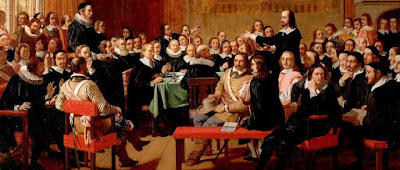Posted at Virginia is for Huguenots:
Let me tell you about the time that the Westminster Assembly passed a proposition authorizing in their Presbyterian church order that women be included in the office of deacon. The story is fascinating, especially of how it ends, and, well, maybe better told by Dr. Wayne Spear in his "Covenanted Uniformity in Religion: The Influence of the Scottish Commissioners on the Ecclesiology of the Westminster Assembly," pp. 119-121.
Let me tell you about the time that the Westminster Assembly passed a proposition authorizing in their Presbyterian church order that women be included in the office of deacon. The story is fascinating, especially of how it ends, and, well, maybe better told by Dr. Wayne Spear in his "Covenanted Uniformity in Religion: The Influence of the Scottish Commissioners on the Ecclesiology of the Westminster Assembly," pp. 119-121.
The Assembly still had before it another proposition from the Second Committee, 'That widows, which we read of, I Tim. v. 3, and elsewhere, are included under the name deacons.'[211] This came up for discussion on December 28 and 29, 1643.
The Independents, especially [Sidrach] Simpson and [William] Bridge, argued most strongly in the Assembly for the inclusion of deaconesses in the church. Simpson, for example, drew from 1 Timothy 5 the points that qualifications for the widow are given, some of them the same as are required for bishops and deacons; that she is to be enrolled, i.e., elected; and that she is not to depart from her employment.[212] Significantly, he related the passage in 1 Timothy to the text that was so central in the Independents' ecclesiology, Romans 12:6-8, understanding 'he that sheweth mercy' (with a curious change in gender) to refer explicitly to the widow, or deaconess. The position taken by the Independents was supported by other leading men of the Assembly only by Lazarus Seaman and George Gillespie.Read more...
